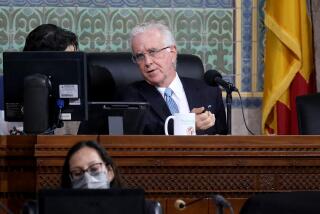Calls to Expand Club Continue
UNITED NATIONS — Make more room at the head table.
That’s the message from a number of nations that feel left out of the powerful, 15-member Security Council, which makes weighty decisions about war and peace.
Expanding the council has been discussed for so long that the Open-Ended Working Group for Security Council Reform is known around U.N. headquarters as the Never-Ending Working Group.
“Since I joined the U.N. 36 years ago, there has been a financial crisis and people talking about reforming the Security Council, but nothing has changed,” said Samir Sanbar, a retired senior U.N. official.
But if Secretary-General Kofi Annan has his way, an expanded Security Council will be part of his legacy when his second term ends in 2006. Last year, he appointed a panel to develop a proposal to make the council reflect today’s world.
The five permanent members that can veto a resolution are the World War II victors that held sway when the U.N. was created in 1945: the United States, Britain, France, China and Russia. The 10 other members are selected from each region of the world for two-year seats.
There were 51 members when the U.N. was created. Today there are 191, which means a long time between terms on the council -- and a larger number of developing countries that feel underrepresented.
Japan, which gives more money to the United Nations than Britain, France, China and Russia combined, thinks it deserves a permanent seat. Not having one is tantamount to “taxation without representation,” Japanese officials say.
During the 2000 Millennium session of the General Assembly, nearly 100 countries said they supported the expansion of the Security Council.
But nothing has happened.
If there is one lever for change, it is Annan’s High Level Panel on Threats, Challenges and Change, which is to deliver its report in December.
The panel is studying three proposals for reform. The first is sometimes called the “quick fix,” which would simply enlarge the permanent group to include large, powerful nations from each region, probably India, Japan, Germany, Brazil and South Africa or Nigeria.
On Monday, British Prime Minister Tony Blair backed India for a seat. “India is a country of 1.2 billion people. For India not to be represented on the Security Council is ... not in tune with the modern times in which we live,” he said.
The second proposal would expand the number of nonpermanent members.
But the panel reportedly favors a third way: creating a category of seven or eight “semi-permanent” members from each region that would hold their seats for renewable terms of four or five years. Only the permanent five would have veto power.
The third way is preferred by such countries as Egypt, Italy, Mexico and Pakistan, which would be sidelined otherwise. But those that have a chance of getting a permanent seat are working together to head it off. During the General Assembly session Tuesday, the leaders of Japan, Germany, India and Brazil held a mini-summit to coordinate their campaign. They issued a joint communique declaring their readiness to take their rightful seats -- along with Africa -- at the diplomatic table.
Any decision by the panel would require the General Assembly’s approval. The decision could come next year but probably won’t happen at all. Top U.N. officials laugh when asked whether change will really come about after all these years. The club, they say, is constructed so that it can’t reform itself.
“None of the permanent members are going to give up their power,” said David Malone, a former Canadian ambassador and a U.N. watcher at the International Peace Academy.
“And why should they? The U.N. is about political power. It’s not a democracy.”
More to Read
Sign up for Essential California
The most important California stories and recommendations in your inbox every morning.
You may occasionally receive promotional content from the Los Angeles Times.










